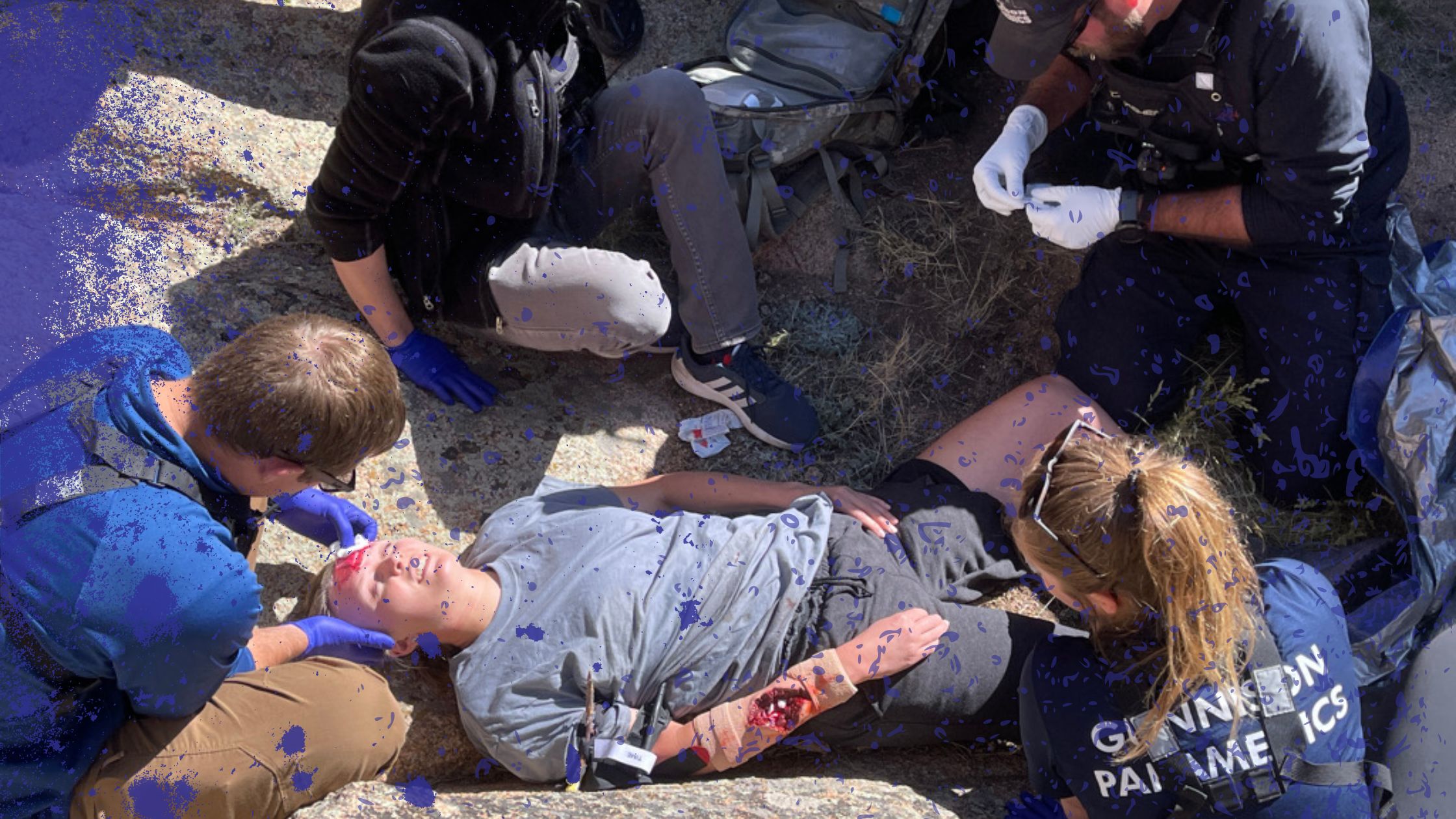
Austere Emergency Care Training
What’s your ETS* Plan?
*Everything turns to s#!%
Like it or not, sometimes as a medical responder, you might find yourself out in the middle of nowhere with a sick patient, functioning with limited resources. When this happens, you might be stuck wondering how long it will be before you can get the patient to a hospital, whether your equipment is enough to treat them and keep them stable, or if your team can withstand the pressure.
Whether you work as a military medic, a first responder, a paramedic, a military medic, or a rural hospital-based nurse or physician, these difficult situations have probably come up at some point in your career. Especially if you work in a remote or rural area, deployed environment, or a disaster situation.
When you are faced with this kind of situation, are you prepared?
- Do you know how to maintain a critically ill or injured person for an extended time?
- Do you know how to be resourceful with equipment and medications available?
- Do you have effective systems in place to set your patient up for the best care?
If you have found yourself navigating these types of situations and want to be better equipped to handle them, you’re in luck.
The Austere Emergency Care course was created just for people like you and circumstances like this.
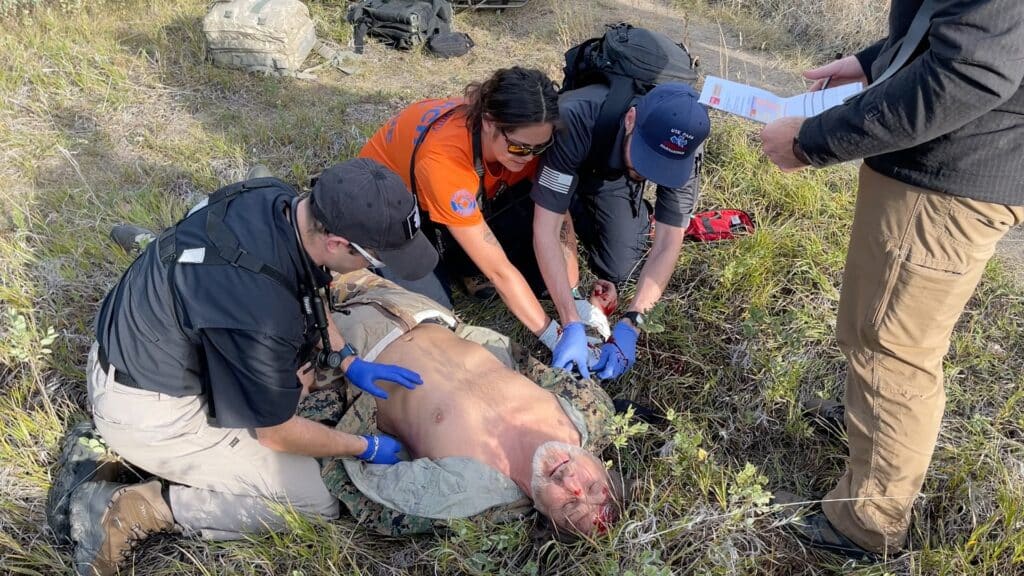
Are you prepared to be in a remote setting with a sick patient who needs extended care?
Military and Civilian Medical Best Practices
Have you ever heard the term, “Prolonged Field Care”? Prolonged Field Care (or “PFC”) is described as a situation where a critical patient needs to be managed in a remote setting for an extended time (i.e. your “worst day”). The Austere Emergency Care course was designed as a PFC training for both military and civilian medics. In fact, it was written and created by the world’s leading experts in U.S. Military Special Operations Forces Prolonged Field Care medicine.
The Austere Emergency Care (AEC) training will prepare you to provide timely and efficient care to serious and critical casualties in austere conditions (situations without robust medical supervision or support). You will learn how to utilize the tools, medicine, and resources on hand to deliver the medical attention needed to save a life when immediate hospital access is not available. This is training on how to practice good medicine in bad situations.
The Austere Emergency Care Course
Participants will gain knowledge based on best practices in medical literature drawing from military Prolonged Field Care (PFC), Prolonged Casualty Care (PCC) and Wilderness Medical Society (WMS) clinical practice guidelines, as well as the latest emergency medical treatments, interventions, and guidelines.
What can you expect from the AEC Course?

Courses typically run for 4 full days. During the course, there is classroom learning, practical labs, and a full-day live action scenario. There are two course tracks based on experience level: Basic Life Support or the Advanced Life Support.

Students are required to review online pre-course lessons and complete a short quiz.

To receive the course completion certificate and continuing education credits, students must complete a final online test. (CE credits are awarded at the authority and direction of the hosting institution.)
Course Structure
Before your course begins, you’ll be assigned a small amount of online pre-work. This work has an easy-to-follow format, and lessons consist of a mix of practical and theory. Participants have commented that this online learning provides a wealth of information prior to the in-person classes, which enhance your learning experience and level of preparedness.
During the in-person training, there will be a balance of lecture presentations and hands-on practical labs that will keep you engaged. You’ll participate in patient care and operational situation discussions with your instructors and the other participants, which gives you time to share lived experiences and knowledge. This course structure will reinforce and improve your current skills and knowledge.
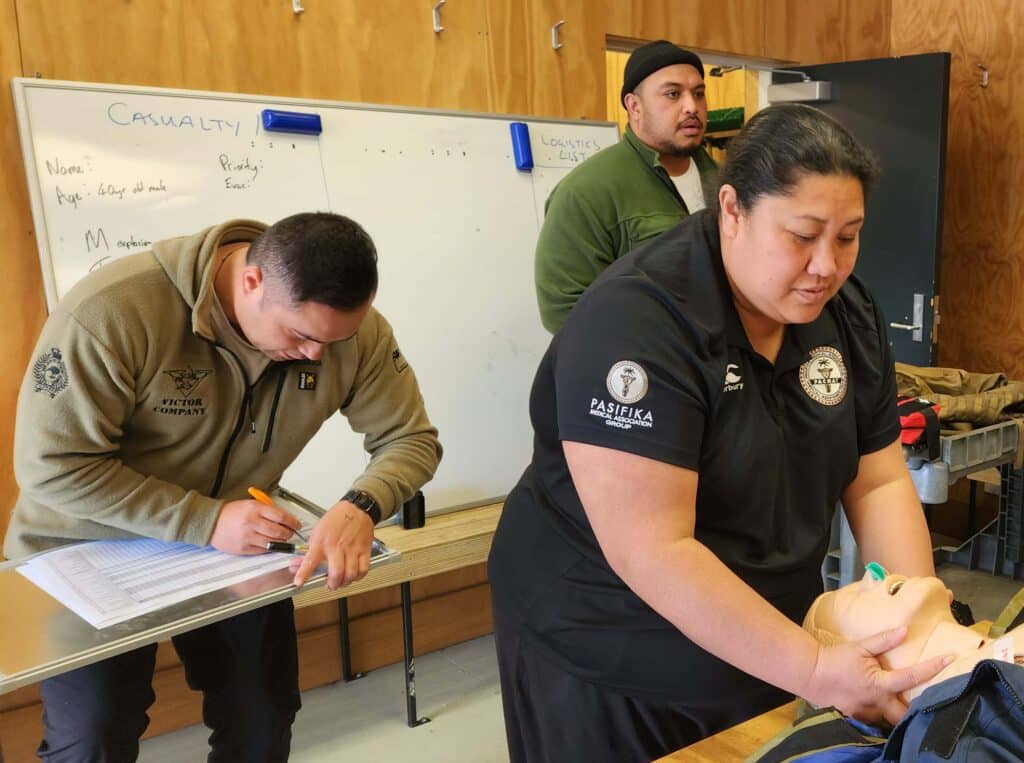
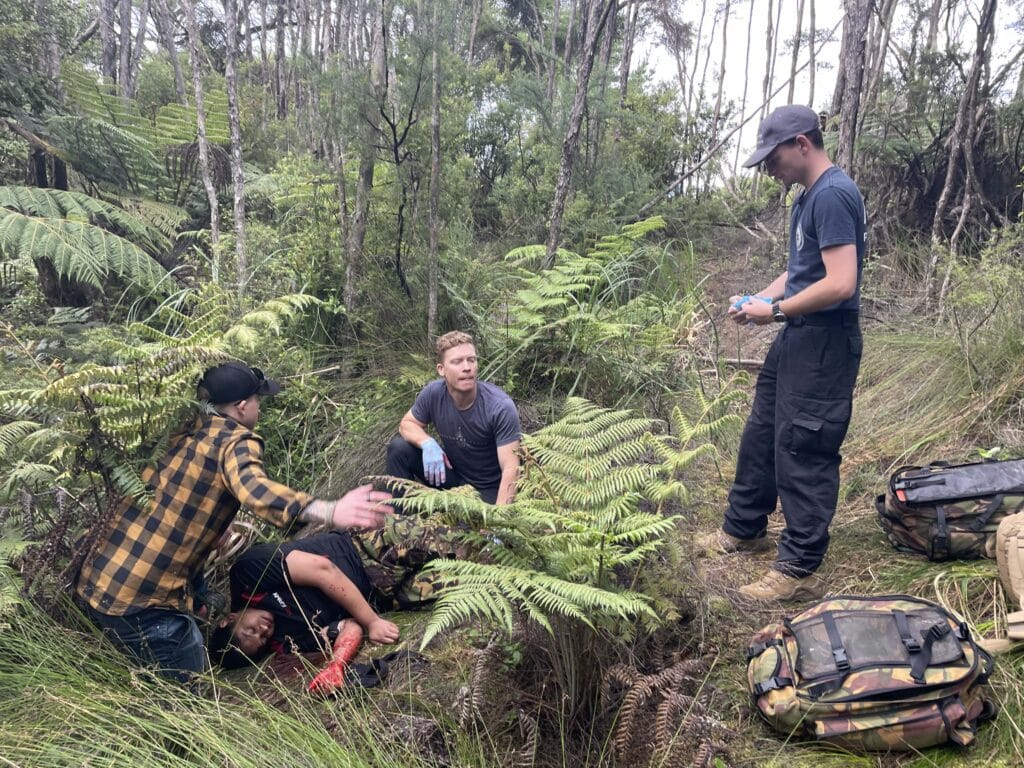
Teamwork
You’ll get to work with people with different skillsets and background, which will amplify your team-work skills and understanding of complex medical situations. Throughout the entire training, you’ll collaborate as a team about treatments and logistics during the interactive scenarios. This fully immersive learning will give you a chance to solve problems creatively, and set a strong foundation of expertise for real-world situations.
Real-world Scenario
On the final day of the course, you’ll participate in a full-day, realistic scenario. As a team, you’ll treat “patients” who are presenting with various simulated medical conditions. This is a chance for you to practice what you’ve learned in a safe and professionally simulated environment. Course instructors will be with you through the entire experience, coaching your team while also providing realistic feedback on treatment decisions.
This enhanced learning experience brings together all the learnings of the week, to reinforce the competencies developed during the course. By working through the scenario as a team, you’ll develop a practical and effective approach to understanding and managing real-life medical situations in austere environments.

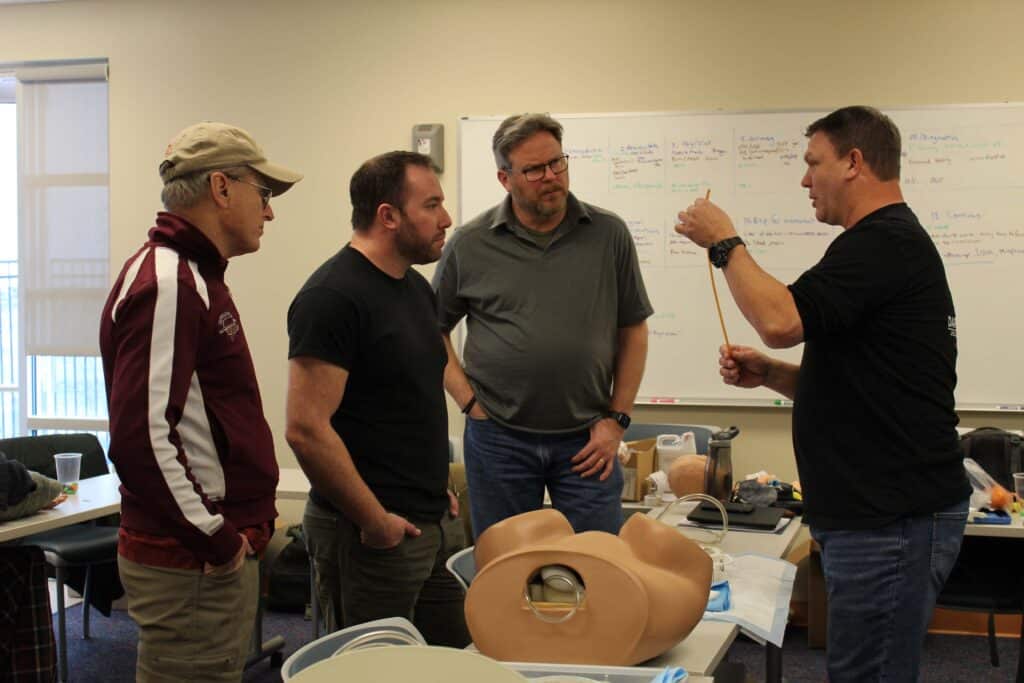
Quality Instructors
All course instructors have been through a rigorous certification process and are subject matter experts, with years of lived and relevant experience. Each instructor is knowledgeable and passionate about this unique blend of prehospital, emergency, and critical care medicine. They are there to support your learning, provide effective feedback and foster discussion. Many participants have mentioned that our instructors are what set this course apart from others. They have a high level of experience, a talent of being able to support all levels of students, and a way of making the course fun and engaging.
Prolonged Field Care Best Practices
During the course, participants will gain knowledge based on best practices in medical literature drawing from military Prolonged Field Care (PFC), Prolonged Casualty Care (PCC) and Wilderness Medical Society (WMS) clinical practice guidelines, as well as the latest emergency medical treatments, interventions, and guidelines.

Relevance to your Work
Many participants have mentioned that the training is directly relevant to their work as military medics or paramedics/nurses in the ambulance service. It can also be easily applied to any disaster response or rural stations. In fact, some international audiences have chosen this course as their continuing education choice to satisfy pre-deployment requirements.
After taking this course, you’ll feel more prepared, confident, and equipped with the knowledge to maintain a critically ill or injured person for an extended time. With a knowledge of best practices and systems from which to draw, you’ll be able to think outside the box and creatively problem solve in difficult environments. Even, and especially when, you are functioning with limited resources and medications. Most important of all, you’ll be saving lives by utilizing best practices in medical and trauma care.
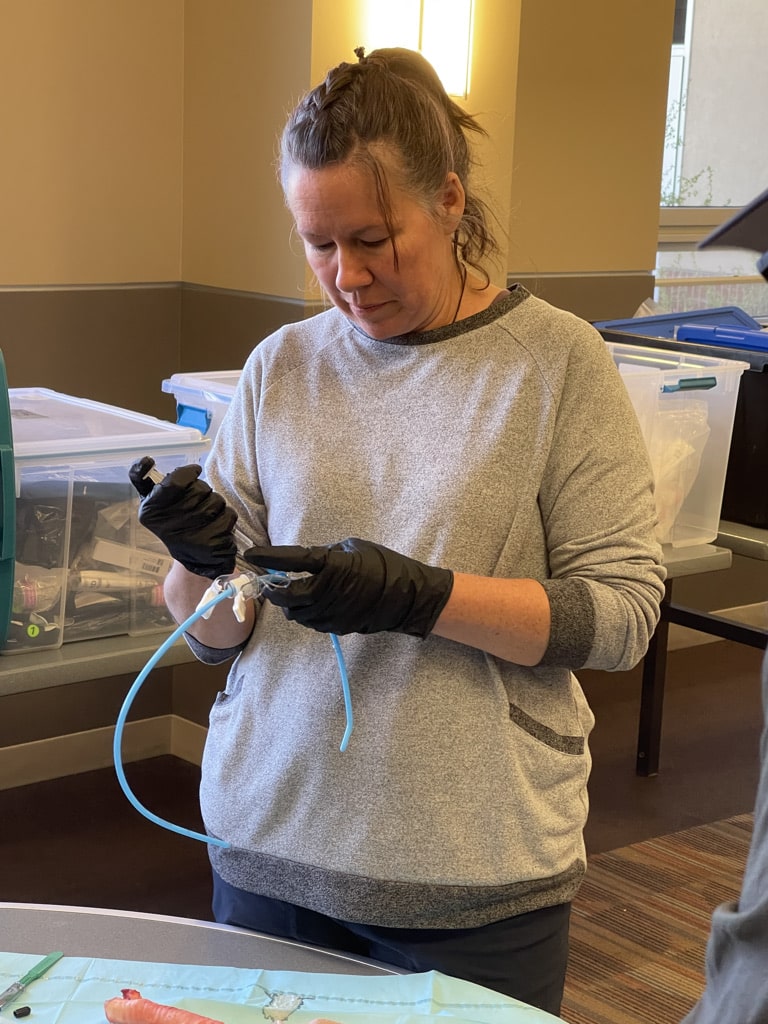
Who Should Take These Courses?
This course is designed for prehospital and other medical providers who currently, or plan to, work in a rural, remote, or austere (resource and medical supervision-limited) environments, or wish to expand their education and training beyond standard medical facility bounds.
Participants include emergency medical responders such as first responders, EMTs, paramedics, nurses, physicians, as well as fire, police, and military personnel. Rescue teams as well as non-governmental organizations (NGOs) who respond to disaster or unique environments also benefit tremendously from the course.
As a pre-requisite, students should have familiarity with Tactical Combat Casualty Care (TCCC) or Tactical Emergency Casualty Care (TECC) training.
Participants taking this course are eligible for:
- up to 40 continuing education (CE) credits
- FAWM credit hours for Fellow candidates of the Wilderness Medical Society (AEC-A participants only)
- a certificate of completion
Ready to Take a Course?
We are proud to partner with international training companies to deliver the best curriculum to participants. If your company is interested in becoming a training partner, please contact us.
Want to join in on a course that’s already scheduled? Check out the calendar.
“As a newer basic EMT, I was blown away by this course. The “real life” aspect of all of the training made everything easy to learn. All of the instructors were so encouraging throughout the entire class. I would highly recommend this course to any level of EMS personnel.”
Melody C
EMT
“SMS courses are the cream of the crop! Top-notch instruction and very relevant classroom and practical training. The instructor staff are professional and share their knowledge with passion and zeal. I highly recommend!”
AEC student
Gunnison Paramedics
subscribe to our newsletter
We send out quarterly updates about upcoming and past trainings, what we are working on, and more.